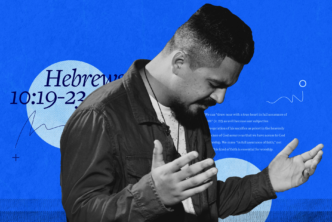Today’s guest post is by Dr. Daniel Bush, author of Live in Liberty: The Spiritual Message of Galatians, Embracing God as Father: Christian Identity in the Family of God, and the forthcoming book, Undefended: Discovering God when Your Guard Is Down. Dan holds a B.Sci. from Michigan Technological University, the M.Div. and Th.M. degrees from Trinity Evangelical Divinity School, and a Ph.D. in systematic theology from the University of Aberdeen (Scotland).
Another Christmas and New Year are in the books, and soon the decorations will be repacked in basement boxes, the tree taken down, and the last leftovers devoured. Life will return to “normal,” and we’ll settle into the struggle to get the year correct on our checks.
Yet for some, the festivities haven’t been joyous, warm, or celebratory. Instead, they were marked by sadness, loneliness, long-frozen memories thawed only to be burnt. It was a time of searching for distractions; a period of bewilderment that doused kindling joy with the chill of doubt; a season of awakening to unfulfilled longings and a cry for compassion.
Maybe you’ve paused to take in this brief piece and right now are thinking, “I didn’t feel that way. My Christmas was wonderful—I even broke-out my dorky holiday sweater—and my New Year was an absolute blast!” If that better describes you, still linger—you never know what insight might prove useful.
This year I neither hung lights outside my home nor decorated inside. In fact, I didn’t set up the tree at all, which also means I avoided trimming it. I didn’t watch a parade, didn’t see a firework, didn’t stand in line to return anything. I wasn’t channeling my inner Ebenezer Scrooge; I simply took a holiday from the holidays. They seemed rather empty given what’s been going on in my life of late—and the external stimuli annoyingly seemed to suggest that I ought to feel differently.
Too often, I think, we rush past our feelings, trying to drown them in merry delirium. Do we take them seriously, exploring them, listening to them? Rarely. It’s easier to view our emotions as unpredictable, unreliable, and illogical. Some fear them and so shove them down and shut them out. Others get lost in them as in an elaborate labyrinth. Few observe and listen attentively.
Consider, however, at how Jesus is portrayed in the Gospels. There you find the portrait of a man who is attuned to emotions, yet doesn’t inhibit himself from expressing them. Jesus doesn’t reject his own feelings as fickle, flaky, or fallible. For him, they’re indispensable tools, like a radio antenna taking in important signals; they align and direct his perception of, communion with, and response to the Father. (Consider Jesus’s emotions in Matt 9:16; 15:7–9, 17; 16:23; Mark 14:6; Luke 7:13; 8:47; 19:41; or John 2:16; 8:44; 11:33.) To be clear, I’m not suggesting we baptize hedonistic inclinations or rationalize self-indulgence. However, as Brennan Manning wrote in A Glimpse of Jesus, “So often we search for God willy-nilly and do not find him until we return to ourselves. In active listening to our feelings we encounter the Holy, not in the earthquake and fire outside but, like Elijah, ‘in the sound of a gentle breeze’ (1 Kings 19:23).”
Not long ago I was buried under a mountain of deep, distressing sorrow. Scripture had brought me little comfort in that season. Yet one night, intensely longing for soul rest, I opened the Book of Common Prayer, which steered me to a passage in the gangling 119th Psalm:
“Remember your word to your servant,
upon which you have caused me to hope.
This is my comfort in my misery:
that your [promise] preserves my life.
The arrogant utterly deride me;
I have not turned aside from your law.
I remember your ordinances of old, O Yahweh,
and I take comfort.
Rage seizes me because of the wicked,
those who forsake your law.
Your statutes have been my songs
in the house of my sojourning.
I remember your name in the night, O Yahweh,
and I heed your law.
This has been mine,
that I have kept your precepts.”
—(Psalm 119:49–56 LEB)
There laid the words of my silent cry, the explanation of my sorrow, and the reason why, although flickering dimly, my hope would not be snuffed out.
In these verses, the psalmist speaks out of his feelings: Sorrow, sadness, and the storming soreness, all of which exist in relation to divine promises that so capture heart and mind that they’ve become the rubric for life. With his Word, the Lord grabbed hold of the psalmist by the short-hairs of the neck; even had he wanted to, he couldn’t run from God and his ways (likely the cause of his predicament and grief). The essence of the passage could be put: “Your word has such hold of me that I hurt; therefore, to you alone I turn—remember me.” That’s not taking matters into your own hands—it’s reliance on God, undefended living!
My own sorrow and bewilderment also sounded forth in a cry for compassion. And compassion, according to theologian Matthew Fox, “is a spirituality of meat, not milk; of adults, not children; of love, not masochism; of justice, not philanthropy. It requires maturity, a big heart, a willingness to risk and imagination.” And this is exactly what I discovered myself beseeching the Father for: “O Father, are you not the big-hearted One, the One who risks all in unfailing love, the One who shatters imagination from the inside?” And love—what it must mean in all of its unconditional fullness—answered, “Yes, my child, I Am.”
I am captured by love. The word of the Lord is love, for the Lord is love. The law of the Lord unfolds love, so love is its fulfillment. The promise of the Lord is to love, and what my feelings most alerted me to was a deep longing to experience just that. In other words, they alerted me to my God-induced longing for the Lord himself. Love had written his name on my soul.
Since that night, I’ve realized: the Christmas season simply reminds us that love has indeed come, that he is near and all around us. And I have the sneaking suspicion that the Baptist’s charge to “prepare the way of the Lord” (Mark 1:3) has everything to do with coming to know my need for love, for only then is rest in Jesus possible. Might the Lord be whispering through my emotions, “My promise of love is not to exchange the sorrow and bewilderment and storm with rest, but to expose my rest beneath it all”? Yes, perhaps he is saying just that. What a comfort—what a Compassionate One.





